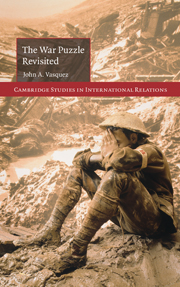Book contents
- Frontmatter
- Contents
- List of Figures
- List of Tables
- Preface
- Preface to the Original Text
- PART I Preliminaries
- Introduction
- 1 Conceptualizing War
- 2 Types of War
- 3 Power Politics and War
- Retrospective Commentary on Part I
- PART II The Onset and Expansion of Wars of Rivalry
- PART III Findings on the Steps to War, 1994–2008
- Appendix I A Propositional Summary
- Appendix II Major Findings on the Steps to War
- References
- Index
- CAMBRIDGE STUDIES IN INTERNATIONAL RELATIONS
2 - Types of War
Published online by Cambridge University Press: 05 June 2012
- Frontmatter
- Contents
- List of Figures
- List of Tables
- Preface
- Preface to the Original Text
- PART I Preliminaries
- Introduction
- 1 Conceptualizing War
- 2 Types of War
- 3 Power Politics and War
- Retrospective Commentary on Part I
- PART II The Onset and Expansion of Wars of Rivalry
- PART III Findings on the Steps to War, 1994–2008
- Appendix I A Propositional Summary
- Appendix II Major Findings on the Steps to War
- References
- Index
- CAMBRIDGE STUDIES IN INTERNATIONAL RELATIONS
Summary
The first step in scientific discovery is classification, but how to classify correctly?
If war is a single phenomenon that has an identifiable set of causes, then there should not be any need for a typology of war. Wars, regardless of time or place, should be associated with the same set of variables, give or take a few qualifications to account for idiosyncratic factors. On the other hand, if war is an amorphous concept that includes seemingly related but in fact very different phenomena, then there will be no clear pattern of correlates associated with war. How can one tell whether war is better conceived as a single phenomenon or several? And, if one thinks war involves several phenomena, how can one disentangle the phenomena so that the factors associated with each are elucidated?
Questions of this sort are standard in the philosophy of science, but to answer them productively requires that we become good scientific detectives – developing hypotheses in light of incomplete evidence, and then using those hypotheses to uncover new clues that will either confirm or falsify our hunches. We should think of war as several phenomena, if extensive research that conceptualizes war as a single phenomenon seems to lead nowhere. The failure of research is often a sign that conceptualization is fundamentally flawed – illuminating the unimportant and obfuscating the significant. An even more significant piece of evidence that a concept may be combining several phenomena is provided when different pieces of research inadvertently produce contradictory results – finding that sometimes war is associated positively with one set of variables and at another time negatively.
- Type
- Chapter
- Information
- The War Puzzle Revisited , pp. 52 - 89Publisher: Cambridge University PressPrint publication year: 2009

